#Dai使い方
Explore tagged Tumblr posts
Text
【これには驚いた】メイカー(MKR)とDaiステーブルコインを徹底解説
#有望銘柄の徹底解説#メイカー仕組み#分散型自律組織#メイカーDAO#ステーブルコインメリット#DeFiメイカー#DeFi基礎知識#分散型ステーブルコイン#MKR将来性#Dai使い方#Dai担保率#ステーブルコインDai#メイカーリスク#メイカー担保#メイカー過剰担保#MKRトークン#DaiUSDT違い#メイカー特徴#メイカーVault#暗号資産安定#イーサリアムDeFi#MKR投資#MKRとは#Dai発行方法#メイカーとは#ステーブルコイン比較#Daiステーブルコイン#Dai価格#メイカー将来性#MKRガバナンス
0 notes
Text


ここではパリ編のマリネットのFAを中心に上げたいと思います☺️使い方慣れてないけど、たくさん反応をありがとう✨
From now on, we will pay attention to Marinette in Paris! Thank you for looking at the picture I posted the other day☺️(I'm using a translator, so I'm sorry if I'm wrong!)
73 notes
·
View notes
Text
お知らせや案内を読もう
Vocabulary for reading notices and information.
お知らせ おしらせ notice; notification
案内 あんない guidance; information; notice
日時 にちじ date and time (of a meeting, notice, etc.)
上旬・初旬 じょうじゅん・しょじゅん the first 10 days of the month
中旬 ちゅうじゅん the middle 10 days of the month
下旬 げじゅん the last 10 days of the month
第#〇曜日 だい#〇ようび the #nd/th 〇day of the month (e.g. 第2月曜日 = だいにげつようび = the second Monday of the month)
年末年始 ねんまつねんし the year-end and the beginning of the New Year (usually holidays in which businesses and the government are closed)
正午 しょうご noon
祝日 しゅくじつ national holiday
休館日 きゅうかんび day on which a museum, library, etc. is closed; closed day
ただし however (used when an exception is given) 「だだし、…」 は例外と言うとき
なお further (used when an explanation is added) 「なお、…」 は説明をつけくわえるときに使います
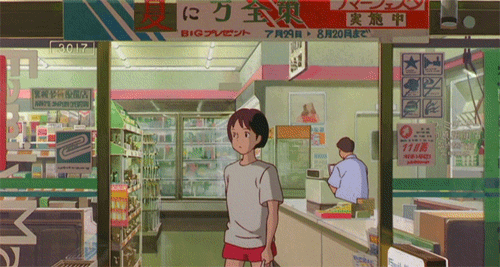
向かい むかい across from/opposite
ななめ向かい ななめむかい diagonally opposite
向こう むこう across from/opposite/beyond
手前 てまえ before
角 かど corner
四つ角 よつかど crossroads
交差点 こうさてん intersection
有料駐車場 ゆうりょうちゅうしゃじょう paid parking lot
つきあたり the end of
前方 ぜんぽう ahead
後方 こうほう behind
右折する うせつする to turn right
左折する させつする to turn left
徒歩 とほ on foot
面している めんしている facing
一方通行 いっぽうつうこう a one-way street
横断歩道 おうだんほどう a pedestrian crossing; crosswalk
#日本語#japanese#japanese language#japanese langblr#japanese studyblr#langblr#studyblr#japanese vocabulary#語彙#単語#jlpt n3#tokidokitokyo#tdtstudy
188 notes
·
View notes
Text

"Shio-ume (塩梅 = Salt plum)"?
Deciding, after all this time, to read more novels to strengthen my Japanese and expand my vocabulary, I scoured the books I had always wanted to read, especially my late father's bookshelves. Naturally, all I found were classic Japanese literature dating back to the pre-Showa period and even centuries earlier.
Two words that have been on my mind recently are ‘Salt plum (塩梅)’.
‘What... suddenly the salt plum...?’
A large red pickled plum with salt gushing out on the surface comes to mind for a moment. However, when reading a novel, the flow of the story is more important, so I seldom stop at a single word, whatever the language.
‘Anbai (塩梅 = just right)’? is this kind of kanji characters. ‘Eh, eh.’
The word means ‘salt and plum vinegar’, and in the days when there was no vinegar, the ume vinegar produced when pickled plums were used to season food. The word was derived from the fact that the taste was ‘It's just right’.
However, this has been a challenge. The Japanese language is deep. Language is a useful tool for learning about a country's history and culture.
Anyway, I made and ate rice balls with salt plums with the seasonal new rice. Yum, Yum!
[Note: Umeboshi (salted ume-plums) are extremely sour and salty that will make saliva spread through your mouth with a sizzle if you are Japanese, just by reading the words or looking at the image.]

「しおうめ」?
今更ながら、日本語を強化し語彙を増やすためにもっと小説を読もうと思い、私はずっと読みたかった本、特に亡き父の本棚を漁った。当然のことながら、私が見つけたのは昭和以前、さらには数世紀前までさかのぼる古典的な日本文学ばかりだ。
近ごろ気になっていた単語が「塩梅」という2文字。
「えっ、いきなり塩梅って…なんだ…?」
塩が表面に噴き出した大粒の赤い梅ぼしが1ケ、一瞬脳裏に浮かぶ。しかし、小説を読むときは、ストーリーの流れの方が重要なので、どんな言語であろうと、一語で立ち止まることはめったにない。
しかし、度々目にすると、流石に気になって調べた。
「あんばい」?ってこういう漢字なんだ。「え、えーっ」!
「塩と梅酢」という意味で、食酢がなかった時代に梅を漬けたときにできる梅酢を使って料理の味付けをしていたそうだ。その味が「良いあんばい」だったことが語源とのこと。良い考えだ!これからは余った梅酢は料理に使おう、と思った。体にも良さそうだ。
しかし、これには参った。日本語は奥が深い。言語とは、その国の歴史や文化を知る上で有効なツールだ。
ともあれ、旬の新米で梅干しおにぎりを作って食べた。うまいうまい!
#umeboshi#Japanese salt plum#language#kanji#culture#traditions#onigiri#rice ball#journal#japanese food#art#nature
94 notes
·
View notes
Text
Haikara Introduction
Text from this page, bolding in original.
時は大正──浪漫の香り満ち、人々の心、いまだ情け知る。
The era is Taisho - full of the scent of romance, people's hearts still knowing the feeling of love.
眉難高校に通う、雲仙、酸ヶ湯、卯花、長万部、阿蘇は
“何にもしない部”・地球防衛部の部室でダラダラ過ごしながら、
学生寮・黒玉寮で共に生活をするごく普通(?)の男子学生。
Unzen, Sukayu, Unohana, Oshamanbe and Aso are male students who spend their days in the clubroom, lazing around as the Do Nothing Club/Earth Defence Club and living normal (?) lives together in the student dorm at Binan High School, the Kurotama Dorm.
ある日5人が黒玉寮で朝風呂していると、湯船の中になにやらヌルっと動くものが。
However, on a certain day, the 5 people are having a morning bath in the Kurotama Dorm when something slippery moves in the bath...
やっとの事で捕まえると、それはしゃべるマヌルネコ・ヌルだった!
They just manage to catch him - the talking Pallas's cat, Nuru!
遠い遠い未来から重大な使命を帯び、地球に滅亡の危機が迫っていることを伝えに来たというヌル。
Nuru says they are charged with an important mission from a far, far future - he came to convey the fact the earth's destruction is approaching.
守りたい…この地球をと言いながらも、自分は危機を知らせにきただけで地球のために戦うかどうかは自由意志で…
…5人で決めてほしいという。これって責任逃れじゃない…?怪しむ防衛部たち。
Although Nuru says he wants to protect the earth and just by notifying them of the danger to themselves, they would fight for the sake of the earth out of free will...but that was what Nuru wanted them to decide. "Isn't this running away from responsibility...?" the Defence Club suspects.
「どっちでもいいなら俺はやるぜ!そっちの方がハイカラだからな!」と張り切る雲仙。
"If whatever's fine, I'll do it! That's because it's haikara!" Unzen says, in high spirits.
自由な心で自ら戦うと決めた5人を
ヌルは猫科学でハイカラ浪漫団に変身させるのだった。
The 5 people, who decided to fight of their own accord with hearts of freedom, are transformed into the Haikara Roman-dan by Nuru using cat science.
その一方…暗躍する謎の3人組・蛮華羅新鋭隊。
Meanwhile...the mysterious 3 person group operating behind the scenes, the Bankara Shin'eitai.
地球征服を企む輩だった。
They are a group that plans world conquest.
(Update: Missed some words. Also slightly changed wording at the end to adhere to the source text better.)
32 notes
·
View notes
Text
Memo for Episode 20 (Ep.44) “Stronghold”
It contains major spoilers, so if you haven't seen the anime yet, don't read on.
猫猫(子翠(シスイ)の正体(しょうたい)は、楼蘭妃(ロウランひ)だった。とんだ役者(やくしゃ)…いや、まるで狸(たぬき)のようだ。四夫人(よんふじん)に特別(とくべつ)授業(じゅぎょう)をした時(とき)、派手(はで)な装(よそお)いで、無表情(むひょうじょう)なまま授業(じゅぎょう)を聞(き)いていた。皇太后様(こうたいごうさま)から隠(かく)れたり、大浴場(だいよくじょう)で里樹妃(リーシュひ)に近(ちか)づかなかったのも、自分(じぶん)が楼蘭妃(ロウランひ)だとバレないようにするためだろう。私(わたし)から隠(かく)れなかったのは、毛毛(マオマオ)を捕(つか)まえた時(とき)に楼蘭妃と気付(きづ)かなかったから…。うすうす感(かん)じてはいたが…。虫好(むしず)きで、ちょっと変(か)わっていて、噂話(うわさばなし)に花(はな)を咲(さ)かせる普通(ふつう)の子(こ)。見事(みごと)、子翠(シスイ)に化(ば)かされていたというわけか…)
Maomao (Shisui’no shotai’wa, Roran-hi datta. Tonda yakusha… iya, marude tanuki’no-yoda. Yon-fujin’ni Tokubetsu-jugyo’o shita-toki, hade-na yoso’oi’de, mu-hyojo-na-mama jugyo’o kiite-ita. Kotaigo-sama’kara kakure-tari, dai-yokujo’de Rīshu-hi’ni chikazuka-nakatta-no’mo, jibun’ga Roran-hi-dato bare-nai-yoni suru-tame-daro. Watashi’kara kakure-nakatta-nowa, Maomao’o tsukamaeta-toki’ni Roran-hi-to kizuka-nakatta-kara… Usu-usu kanjite’wa ita-ga… Mushi-zuki’de, chotto kawatte-ite, uwasa-banashi’ni hana’o sakaseru futsu’no ko. Migoto, Shisui’ni baka-sareate-ita-to-iu wake-ka…)
Maomao (Shisui’s true identity was Concubine Loulan. What an actress. Or maybe she’s more like a tanuki. When I gave that lecture to the four concubines, she had that flashy outfit and listened expressionlessly. She hid from the empress dowager and avoided Concubine Lishu at the baths so that she wouldn’t be recognized as Concubine Loulan. She didn’t hide from me, since I didn’t recognize her as Concubine Loulan when we caught Maomao the cat. I was starting to get the hint, but… An insect-loving, quirky, gossipy, but ordinary girl. Shisui played us all.)
とんだ(Tonda): unexpected, what a 〇〇!
とんでもない(Ton-demo-nai): unbelievable, outrageous
とんだ and とんでもない are similar but とんでもない contains a condemnation of something bad when you use it about others. (When you use とんでもない about yourself, it means humility. For example, someone say “You’re so beautiful!” and you answer “とんでもないです” that means “Not at all!”)
役者(やくしゃ/Yaku-sha): actor = 俳優(はいゆう/Haiyu) 役者 and 俳優 can be used regardless of gender.
女優(じょゆう/Joyu): actress (used for women only)
化かされる(ばかされる/Baka-sareru): be bewitched by, be tricked by
化かす(ばかす/Bakasu): bewitch, trick
化ける(ばける/Bakeru): appear in disguise, transform
In Japanese folk tales, raccoon dogs(tanuki) and foxes often trick humans by transforming into beautiful women or someone who looks like a real human. In KNH Lakan and Lahan are often described as foxes and Shishou as a tanuki because of their appearances and cunningness. In Japan, when describing people as animals, a cunning-looking person is compared to a fox, and a seemingly good person who deceives others is compared to a tanuki.
Finally, the true identity of Shisui was revealed to be Concubine Loulan. When I first read the original novel, I didn’t expect that at all and I was so surprised! Even knowing that, I was surprised that Loulan’s voice and the way she spoke sounded completely different from Shisui’s.
――――――――――――――――――――――――――――――
猫猫「楼蘭(ロウラン)は、その名前(なまえ)を気(き)に入(い)っているようですね。下女(げじょ)として偽名(ぎめい)を使(つか)うなら、もっと違(ちが)う名(な)を選(えら)べば良(よ)かったのに」
Maomao “Roran’wa, sono namae’o ki’ni-itte-iru-yo-desu-ne. Gejo-to-shite gimei’o tsukau-nara, motto chigau na’o erabeba yokatta-noni.”
Maomao “Loulan seems to like that name. She could have chosen any other name as her servant pseudonym.”
偽名(ぎめい/Gimei): pseudonym
翠苓「そういう子(こ)なんだ」
Suirei “So-iu ko nan-da.”
Suirei “It’s just how she is.”
The translation is perfect. I think this is an example of the translation that cannot be made by simply substituting words.
猫猫(同(おな)じ男(おとこ)の娘(むすめ)として生(う)まれたのに、母(はは)が違(ちが)うだけで、一方(いっぽう)は蝶(ちょう)よ花(はな)よと育(そだ)てられ、帝(みかど)の花(はな)として献上(けんじょう)される。そしてもう一方(いっぽう)は、官女(かんじょ)として後宮(こうきゅう)に送(おく)り込(こ)まれ、暗躍(あんやく)する。中祀(ちゅうし)での壬氏様(ジンシさま)暗殺未遂(あんさつみすい)事件(じけん)に、翠苓(スイレイ)は関(かか)わっていた。倉庫(そうこ)の爆発(ばくはつ)の混乱(こんらん)に乗(じょう)じて祭具(さいぐ)を盗(ぬす)み、発覚(はっかく)したら死人(しにん)を装(よそお)って逃走(とうそう)した。そして、先日(せんじつ)の飛発(フェイファ)を使(つか)った襲撃事件(しゅうげきじけん)も、子昌(シショウ)が黒幕(くろまく)だったのだろう。後宮管理者(こうきゅうかんりしゃ)の壬氏様(ジンシさま)は、後宮(こうきゅう)の有(あ)り方(かた)を変(か)えようとしていた。子昌(シショウ)のやり方(かた)に反(はん)するように。…しかし、それだけか?子翠(シスイ)…いや、楼蘭(ロウラン)が価値(かち)があると言(い)ったかんざし。ただの官(かん)ではない。いや、宦官(かんがん)ですらなかった)
Maomao (Onaji otoko’no musume-to-shite umareta-noni, haha’ga chigau-dakede, ippo’wa choyo-hanayo-to sodate-rare, mikado’no hana-to-shite kenjo-sareru. Soshite mo-ippo’wa, kanjo-to-shite kokyu’ni okuri-komare, an’yaku-suru. Chu-shi’deno Jinshi-sama ansatsu-misui-jiken’ni, Suirei’wa kakawatte-ita. Soko’no baku-hatsu’no konran’ni jojite saigu’o nusumi, hakkaku-shitara shi-nin’o yoso’otte toso-shita. Soshite, sen-jitsu’no feifa’o tsukatta shugeki-jiken’mo, Shisho’ga kuro-maku datta-no-daro. Kokyu-kanri-sha’no Jinshi-sama’wa, kokyu’no arikata’o kae-yoto-shite-ita. Shisho’no yari-kata’ni han-suru-yoni. …Shikashi, sore-dake-ka? Shisui… iya, Roran’ga kachi’ga aru-to itta kanzashi. Tada’no kan’dewa nai. Iya, kangan-de-sura nakatta.)
Maomao (Even though they were born from the same father, just because their mothers were different, one gets treated as a treasured princess to be given to the emperor. The other is sent in as a court lady to scheme in the shadows of the rear palace. Suirei was part of the attempt to assassinate Master Jinshi at that ceremony. She used the explosion at the warehouse as cover to steal some ceremonial tools, and when she was caught, she escaped, feigning death. And Shishou must have been the mastermind behind the feifa attack the other day. Master Jinshi, the manager of the rear palace, was trying to make changes. It wasn’t in line with what Shishou was doing. Is that all, though? Shisui… I mean, Loulan said this hair stick was valuable. He isn’t just some official. Rather, he wasn’t even a eunuch.)
蝶よ花よと育てられる(ちょうよはなよとそだてられる/Cho-yo hana-yo-to sodate-rareru): be brought up like a princess
献上する(けんじょうする/Kenjo-suru): to present something to someone noble/of the upper classes
暗殺未遂(あんさつみすい/Ansatsu-misui): assassination attempt = 暗殺(あんさつ/Ansatsu): assassination + 未遂(みすい/Misui): attempted
黒幕(くろまく/Kuro-maku): mastermind
――――――――――――――――――――――――――――――
翠苓「食事(しょくじ)は持(も)って来(く)る。くれぐれも、神美様(シェンメイさま)のご機嫌(きげん)を損(そこ)ねないように」
Suirei “Shokuji’wa motte-kuru. Kure-gure-mo, Shenmei-sama’no gokigen’o sokone-nai-yoni.”
Suirei “Food will be brought to you. Just make sure you don’t anger Lady Shenmei.”
くれぐれも(Kure-gure-mo): (When asking someone to do something important, to call someone’s attention) Make sure to~, Be careful to~, I repeatedly ask you to~
――――――――――――――――――――――――――――――
猫猫(里(さと)からここに連(つ)れて来(こ)られる時(とき)、一緒(いっしょ)に行(い)��と言(い)った響迂(キョウウ)に、翠苓(スイレイ)は渋(しぶ)い顔(かお)をした。本当(ほんとう)は里(さと)にとどめておきたかったのかもしれない。もし、子(し)の一族(いちぞく)が謀反(むほん)を起(お)こしたとなれば、一族郎党(いちぞくろうとう)、その罪(つみ)を負(お)わされるだろう。それは、女(おんな)、子供(こども)でも、赤子(あかご)でも。子供(こども)たちは知(し)っているのだろうか。大人(おとな)たちは、教(おし)えたのだろうか)
Maomao (Sato’kara koko’ni tsurete-korareru-toki, issho-ni iku-to itta Kyo-u’ni, Suirei’wa shibui kao’o shita.
Honto’wa sato’ni todomete-oki-takatta-no-kamo shire-nai. Moshi, Shi’no ichi-zoku’ga muhon’o okoshita-to-nareba, ichi-zoku-roto, sono tsumi’o owa-sareru-daro. Sore’wa, onna, kodomo-demo, akago-demo. Kodomo-tachi’wa shitte-iru-no-daro-ka. Otona-tachi’wa, oshieta-no-daro-ka.)
Maomao (When I was brought here from the village, Kyou-u insisted he’d come too, but Suirei seemed reluctant. Perhaps she wanted to keep him at the village. If the Shi clan rebels, the punishment will extend to the entire clan. No one will be spared. Not even women, children, or babies. Do the children know? Did the adults tell them?)
一族郎党(いちぞくろうとう/Ichi-zoku-roto): one’s whole clan, one’s family and followers
Generally speaking, when the word “一族郎党” is used, it is often followed by ominous words like “皆殺し(みなごろし/Mina-goroshi): kill them all” or “根絶やし(ねだやし/Ne-dayashi): exterminate them.”
猫猫「他人事(ひとごと)だと割(わ)り切(き)ってしまえばいいのに…」
Maomao “Hito-goto-dato wari-kitte-shimaeba ii-noni…”
Maomao “I should just write this off as someone else’s problem….”
他人事(ひとごと/Hito-goto): somebody else’s business/problem, another person’s affairs
割り切る(わりきる/Wari-kiru): divide, separate – In this line, like “If only I could think of this as someone else’s problem and I could separate it from myself…” = It’s so painful for me that I can’t just accept it as something that doesn’t concern me.
――――――――――――――――――――――――――――――
楼蘭(母(はは)が父(ちち)に憤(いきどお)っている。ここは一緒(いっしょ)に怒(おこ)るところ)
Roran (Haha’ga chichi’ni ikido’otte-iru. Koko’wa issho-ni okoru-tokoro.)
Loulan (Mother is angry at father. This is where I get angry with her.)
I think this translation should have been “Mother is angry at father. This is where I get angry with him/father, together/along with her/mother. I guess they translated “一緒に(いっしょに/Issho-ni)” into “with her”, which could cause the viewers’ misunderstanding for “angry with/at her.”
��―――――――――――――――――――――――――――――
壬氏「軍師殿(ぐんしどの)の言(い)いたいことは分(わ)かります。私(わたし)の不甲斐(ふがい)なさが問題(もんだい)なのでしょう」
Jinshi “Gunshi-dono’no iitai-koto’wa wakari-masu. Watashi’no fugai-nasa’ga mondai-nano-desho.”
Jinshi “Master Strategist, I know what you’re trying to say. You’re dissatisfied with my shiftless cowardice.”
不甲斐なさ(ふがいなさ/Fugai-nasa): being pathetic/inefficient/useless (noun)
不甲斐ない(ふがいない/Fugai-nai): pathetic, inefficient, useless (adjective)
――――――――――――――――――――――――――――――
壬氏(軍師殿(ぐんしどの)の、娘可愛(むすめかわい)さを思(おも)えば、来(く)るのが遅(おそ)かったくらいだ。抜(ぬ)け穴(あな)のこと。消(き)えた宦官(かんがん)のこと。子翠(シスイ)という存在(そんざい)しない下女(げじょ)のこと。全(すべ)て後手(ごて)に回(まわ)り、結果的(けっかてき)に猫猫(マオマオ)がさらわれた。俺(おれ)の責任(せきにん)だ)
Jinshi (Gunshi-dono’no, musume-kawaisa’o omoeba, kuru-noga oso-katta-kurai-da. Nuke-ana’no koto. Kieta kangan’no koto. Shisui-to-iu sonzai-shinai gejo’no koto. Subete gote’ni mawari, kekka-teki’ni Maomao’ga sarawareta. Ore’no sekinin-da.)
Jinshi (Given how much he dotes on his daughter, it’s actually surprising he took so long to show up. The secret escape route, the missing eunuch, the non-existent servant girl named Shisui… We were one step behind in every instance, resulting the kidnapping of Maomao. I’m responsible for this.)
後手に回る(ごてにまわる/Gote’ni mawaru): fall behind, be one step behind = 後手後手になる(ごてごてになる/Gote-gote-ni naru)
⇔ 先手を打つ(せんてをうつ/Sen-te’o utsu): take the initiative in, make a pre-emptive moves to
――――――――――――――――――――――――――――――
壬氏(軍師殿(ぐんしどの)はお見通(みとお)しなのだ。本来(ほんらい)の自分(じぶん)の立場(たちば)に自信(じしん)を持(も)つことができず、そこから逃(に)げ出(だ)して、この地位(ちい)にあぐらをかいていると)
Jinshi (Gunshi-dono’wa omitooshi-nanoda. Honrai’no jibun’no tachiba’ni jishin’o motsu-koto’ga deki-zu, soko-kara nige-dashite, kono chii’ni agura’o kaite-iru-to.)
Jinshi (He knows everything. He knows I lack the confidence to assume my rightful position. He knows how I ran away from it to spend my time here instead.)
お見通し(おみとおし/Omitooshi): see through, already know, know everything
あぐらをかいている(Agura’o kaite-iru): It originally means “sitting cross-legged,” but here, it means “relaxing without making any effort, satisfied with my current position.”
羅漢「半端(はんぱ)な姿(すがた)で、半端(はんぱ)な仕事(しごと)をして、それで何事(なにごと)もうまくいくとでも?…半端(はんぱ)な、宦官野郎(かんがんやろう)のままで…何(なに)ができると言うんです!!」
Rakan “Hanpa-na sugata’de, hanpa-na shigoto’o shite, sorede nani-goto’mo umaku-iku-to-demo? …Hanpa-na, kangan-yaro’no mama’de… nani’ga dekiru-to iun-desu!!”
Lakan “Your appearance, your work… all half-measures. And you think everything will just all work out somehow? What can you ever hope to achieve acting as a sorry eunuch?!”
半端な(はんぱな/Hanpa-na): halfway, incomplete, cagmag
〇〇野郎(〇〇やろう/〇〇yaro): insulting word for men -野郎(やろう/yaro): rougher word than “man/guy”
――――――――――――――――――――――――――――――
羅漢「お…お…叔父貴(おじき)!?あ…ん…」
Rakan “O…O…Oji-ki!? A… N…”
Lakan “U-Uncle?!”
叔父貴(おじき/Oji-ki): Uncle (When men call their uncles) = 叔父さん(おじさん/Oji-san)
Generally speaking, regardless of gender, we call our uncles “おじさん”, but it sounds a bit polite, so some guys use a rougher word, 〇〇貴(〇〇き/〇〇ki). But I’ve never heard of anyone actually using it around me… It’s common in anime, TV dramas, and movies. Maybe you’ve heard of “兄貴(あにき/Aniki): Big Bro” or “姉貴(あねき/Aneki): Big Sis” in another anime or something.
――――――――――――――――――――――――――――――
羅漢「分(わ)かってるよ、叔父貴(おじき)。さっきのは、売(う)り言葉(ことば)に買(か)い言葉(ことば)で…あんなこと言(iい)うつもりは、これっぽっちもなかったんだ」
Rakan “Wakatteru-yo, Oji-ki. Sakki-nowa, uri-kotoba’ni kai-kotoba’de… anna-koto iu-tsumori’wa, koreppocchi’mo nakattan-da.”
Lakan “I know, Uncle. That was just, you know, an exchange that took an unexpected turn. I didn’t mean to say those things, not one bit!”
売り言葉に買い言葉(うりことばにかいことば/Uri-kotoba’ni kai-kotoba): tit for tat, the exchange of harsh words
In Japanese, we use the word “売る(うる/Uru): sell” to mean to “start/pick” a fight, and “買う(かう/Kau): buy” to take up the fight. Of course, there is no money exchange in it, though.
壬氏(いや…何(なん)の言葉(ことば)も売(う)っていないが…)
Jinshi (Iya… Nan’no kotoba’mo utte-inai-ga…)
Jinshi (An ‘exchange’? I didn’t say anything…)
“No, I didn’t sell any word…”(direct translation)
I like this line very much. How calm and patient Jinshi is…
――――――――――――――――――――――――――――――
羅漢「お願(ねが)いに参(まい)りました。逆賊(ぎゃくぞく)・子昌(シショウ)を討(う)つべく、軍(ぐん)を動(うご)かしていただきたいと!」
Rakan “Onegai’ni mairi-mashita. Gyaku-zoku, Shisho’o utsu-beku, gun’o ugokashite-itadaki-tai-to!”
Lakan “I come to you with a plea. I humbly request that you rally the army to defeat Shishou, the traitor!”
逆賊(ぎゃくぞく/Gyaku-zoku): rebel, traitor
I wonder why they translated it into “traitor,” not into “rebel.” 逆賊 is a very strong word which means a villain who rebels against his master or the leader of his country and who must be caught and executed. For me, the word “traitor” sounds lighter and less serious.
羅半「子(シ)の一族(いちぞく)は数年前(すうねんまえ)より、新型(しんがた)の飛発(フェイファ)を製造(せいぞう)しているようです。飛発(フェイファ)を用(もち)いた暗殺未遂(あんさつみすい)。楼蘭(ロウラン)の逃亡(とうぼう)の件(けん)もございます」
Rahan “Shi’no ichi-zoku’wa su-nen-mae-yori, shin-gata’no feifa’o seizo-shite-iru-yodesu. Feifa’o mochiita ansatsu-misui. Roran’no tobo’no ken’mo gozai-masu.”
Lahan “The Shi clan seems to have been manufacturing a cutting-edge model of feifa for several years now. There’s also the assassination attempt using said feifa, as well as the case of Loulan’s escape.”
I got goosebumps watching this scene. Not only the Lakan’s mannerisms, but also the way Lahan spread out the document in front of Jinshi, then quickly stepped back and lined up next to Lakan, and how Luomen was clearly showing the same respect even without kneeling… everything was so cool and amazing.
――――――――――――――――――――――――――――――
羅漢「謀反(むほん)の証拠(しょうこ)は揃(そろ)っています。膿(うみ)は早(はや)めに出(だ)し切(き)るべきです」
Rakan “Muhon’no shoko’wa sorotte-imasu. Umi’wa hayame-ni dashi-kiru-beki desu.”
Lakan “We have all of the evidence to prove that this is a rebellion. This problem needs to be addressed immediately.”
膿を出し切る(うみをだしきる/Umi’o dashi-kiru): It originally means “drain the pus,” but here, it means “remove all the bad stuff that’s built up inside.” We often use this expression when there is something bad in an organization.
――――――――――――――――――――――――――――――
羅漢「いつまで…仮初(かりそ)めの姿(すがた)で欺(あざむ)き続(つづ)けるつもりですか?壬氏様(ジンシさま)。いえ…月(つき)の君(きみ)」
Rakan “Itsu-made… karisome-no sugata’de azamuki-tsuzukeru-tsumori-desu-ka? Jinshi-sama. Ie… Tsuki’no Kimi.”
Lakan “How long do you intend to fool everyone with your false role, Master Jinshi? Or rather… Moon Prince?”
I think that in the original novel Lakan didn’t say “Master Jinshi? Or rather… Moon Prince?” but he did know the true identity of Jinshi, so that was added in the anime. Although Lakan cannot distinguish between people’s faces, he has what seems to be a special ability to see into people’s true nature.
――――――――――――――――――――――――――――――
Shisui’s true identity was revealed, and the story of Season 2 is quickly reaching its climax. In this episode, her long monologue, which begins with the line “Mother is laughing,” was probably not in the original novel and was added in the anime. It was a great episode and I like it very much. Right now, I’m both excited to see the rest of the episodes and sad that the season is coming to an end, and I guess you all feel that way. Let’s enjoy Season 2 until the end together!
#apothecary english#apothecary romaji#apothecary diaries#the apothecary diaries#learning japanese#japanese#薬屋のひとりごと#薬屋のひとりごと 英語#薬屋 英語 学習#japan#KNH#season 2
20 notes
·
View notes
Text
Why the Sekoto Peak fire shouldn’t have happened or, how it should have happened DIFFERENTLY from what we were told
No, I’m not going to talk about how Enji and Rei should have prevented it, I’m going to talk about the logistic that shouldn’t allow it to take place.
Anyway this is how Enji describes what has happened in chap. 291.
Todoroki Enji ‘(Ano hi wa kogarashi ga fuki susande kūki ga kansōshite ita. Mukashi ore ga TRAINING ni yoku tsukatte ita SEKOTO take de Tōya wa yakete shinda. Honō wa 2000 ℃ o koete itarashiku itai wa nokoranakatta. Kasai no jōshō kiryū de tankashita hone mo kona to natte chitta sōda. Karoujite mitsukatta no wa kagakubu no hone ga ichibu… soredemo tōji ore wa────)’ 轟炎司「(あの日は木枯らしが吹き荒んで空気が乾燥していた。昔俺がトレーニングによく使っていた瀬古杜(セコト)岳で燈矢���焼けて死んだ。炎は2000℃を超えていたらしく遺体は残らなかった。火災の上昇気流で炭化した骨も粉となって散ったそうだ。辛うじて見つかったのは下顎部の骨が一部…それでも当時俺は────)」 Todoroki Enji (That day, the wind was blowing hard and the air was dry. Tōya was burned to death on Sekoto Peak, where I used to train a lot. The flames were over 2000°C and no corpse was left behind. The updrafts from the fire apparently charred his bones, scattering them into powder. All we managed to find was a part of his lower jaw... but even so, at the time I was…) [Chap. 291]

Now, forest fire flames can reach temperatures that ranges from 800°C/1200°C.
Flames being above 2000°C would require a blue fire, blue fire that not only isn’t drawn anywhere in the colored manga and anime, where it’s consistently red, but that Enji apparently didn’t notice either as he doesn’t connect the fire color to Dabi (fire types might have been common but fire types that reached such heat weren’t).
That high temperature is necessary not so much because Touya back then had blue fire but because that temperature is needed to melt the bones. Bones melt at 1670 °C, if the fire hadn’t been above that temperature they should have found Touya’s full skeleton. As it went over 2000°C the whole ‘the bones were turned in ashes and weren’t found’ works.
But the fact no one realized the fire was and should have been blue for it to reach that temperature is not the real problem, we can always assume the anime missed the 2000°C reference, that the colored manga just used the anime coloring without thinking too much at it, or that just the fire reached such high temperature in its center where it started, but not where it spread so the borders of it, which are what Enji sees, were 1200°C at best (it’s the color of orange fire, if we go above the fire should have been white and then turn blue).
Anyway the coloring is details what really becomes troublesome is what we are told in chap. 302.
Todoroki Tōya ‘Deru na…! Namida nanka… chikushō… Otō-sa…’ 轟燈矢「出るな…!涙なんか…ちくしょう…お父さ…」 Todoroki Tōya “Don’t cry...! Stupid tears... Damn it... Fathe...”
Todoroki Tōya ‘Waa! Aa! Tomaranai! Honō ga────!!’ 轟燈矢「わあっ!あっ!止まらない!炎が────‼」 Todoroki Tōya “Waah! Aah! They won’t stop! The flames────!!” [Chap. 302]
Todoroki Tōya ‘Are wa atsukatta na. Ma, jigōjitoku da yo na. Karyoku no age kata shika oshiete kurenakatta mon nā.’ 轟燈矢「あれは熱かったな。ま、自業自得だよな。火力の上げ方しか教えてくれなかったもんなあ。」 Todoroki Tōya “That was hot. Well, it’s my own fault. He only taught me how to increase the heat.” [Chap. 302]


Basically Touya’s tears took fire and, from there, his whole body took fire and he couldn’t stop it so this set the whole forest to fire. To stop burning Touya tossed himself in the nearby river because, supposedly, he had been taught only how to increase the heat, not how to stop it… and this is a real mess.
The fire Quirk is already a magical Quirk because in order to start a fire one needs a heat source (which I guess the Quirk could produce), oxygen, which it can find in air, and some fuel to burn as heat, oxygen and fuel form the fire triangle.
However the Todorokis apparently produce fire without needing fuel. We can assume though that since Tōya’s tears took fire, it’s possible they’ve the fuel in form of body fluids so, kind of like how Bakugō excretes nitroglycerin-like sweat, they might possibly excrete oil-like fluids, which take fire if they heat them up.
Too bad we saw Touya cry in the same chapter more than once (when Natsuo said he didn’t want to hear him,

when his flames turned blue,

when he faced his father)

and his tears didn’t take fire otherwise the whole house would have burned down when Natsuo refused to listen to him, or when his flames turned blue, or when he talked with Enji (never mentioning during the first war Shouto had to cool Enji down because he was too hot but Enji didn't start to self combust due to it).
We also have Chap. 301 showing us a similar situation in which Touya seems to take fire but, back then, it seemed it was his hair who took fire CLEARLY not his tear and it only last a moment, his whole body didn’t take fire, he didn’t burn down the whole house and that wonderful wood floor with himself.

Let’s assume that the manga image is unclear and mislead us and the anime maker, it’s not the tears that took fire, it’s sweat, which would be why Touya’s whole body took fire.
So crying raised his temperature, the sweat/fuel took fire, Touya began burning and… he couldn’t stop because apparently he wasn’t taught how.
Too bad that in chap. 291 we saw THREE-YEAR-OLD Touya using his fire and, when he realizes said fire is burning him he… stops it.



THREE-YEAR-OLD Touya knew how to stop his fire and it stands to reason since he continued using his fire he would have continued to know how to stop it.
And it doesn’t take genius knowledge to stop Touya’s fire either, we see how in Kamino Touya tries to burn Kamui Wood but is knocked down by Gran Torino (Chap. 87)

and his fire shut down. In Kyushu is fire shuts down short after he got teleported away (Chap. 191).

Touya’s fire gets snuffed out when Vlad King slams him against a wall (chap 82).

The only case we have of it continuing to burn is during the training camp after he was teleported away, though in that case it could be of the trees taking fire on their own due to being exposed to such heat or of Touya not turning it off deliberately even though he was teleported away (Chap. 83).

Even when he was all on fire as he was about to shoot a Prominence Burn, when Best Jeanist cables caught him, the fire got snuffed out (Chap. 291) and he'll have to turn it on later to burn those same cables.


All this seems to imply Touya needs to be focused on keeping it turned on for his fire to keep on burning. If he gets knocked down or loses focus because he gets hit or gets distracted his fire immediately snuffs out.
Now, AFO said he was keeping an eye on Enji and he’s the one to kidnap Touya after he burned. If the story has said that AFO managed to either get Touya to ingest or be injected with a dose of a variant of Trigger (there’s plenty of variants) he could have lost control of his Quirk. Same if he had used another version of his forced activation Quirk on him (the one he uses on Kurogiri requires stabbing the person you want to force to active their Quirk).
This would have made sense, it would have explained why Touya’s fire started all of sudden to rage as hard as possible and he couldn’t stop it and why AFO was conveniently there, as well as match with AFO’s statement he was keeping an eye on the Todoroki family and his manipulative personality. Same as how he has triggered Tenko’s tragedy he might have triggered Touya.
But no, apparently his only involvement was deciding to randomly go on Sekoto Peak on the same day in which Touya burned himself, find him still not carbonized and retrieve him.
How did AFO could know Touya would end up burning himself when he went there tons of times and NOTHIG HAPPENED and that he would do it on that day? How did he know the fire was due to Touya burning himself and not due to someone else? Did he keep Sekoto Peak under watch better than the local firemen?
It’s bad enough that Touya sets himself on fire and can’t unset himself on fire but AFO claiming he kept his eyes on Enji FOR AGES and can’t help but sow seeds when he sees a fertile ground and then all he did was stumble upon burned Touya, pick it up, keep him on hold in coma for three years, talk to him, MAKE HIM ESCAPE and let him go so that he could tattle on Enji about Garaki grooming child factory hadn’t Enji screwed up and caused Touya to leave home.
All this while they could have just captured him back and turned him into an obedient Nomu, maybe one like Kurogiri instead than one like the high ends, as Touya’s speculated was their plan from the start. By the way he has this hottest Quirk and they didn’t even copy it to give it to one of the Nomu.
AFO didn’t even insure Touya wouldn’t tattle about it to Enji should he have decided to stay home.
Garaki only claims they didn’t believe Touya would have survived for long (hence him joining Tomura wasn’t part of their plan) AND AFO NEVER TRIED AGAIN TO TARGET ONE OF ENJI’S KIDS. EVEN IF HE HAD KEPT AN EYE ON ENJI FOR A LONG TIME.
Why keeping an eye on Enji if he wasn't going to act? We don’t know.
To sum this up… it doesn’t make sense Touya would have unwillingly immolated himself with his own fire, unwillingly starting such an intense fire and unable to set it off, but it would have made a lot of sense if AFO had had a hand in it… only AFO apparently only stole Touya’s body by a LUCKY COINCIDENCE and then bragged about always having kept an eye on Enji. That’s it or we’re missing a chapter in which AFO talks of how he orchestrated the whole ‘Touya setting himself on fire’.
Overall the whole thing speaks of poor setting.
Horikoshi wanted Touya to ‘die in a fire’ but didn’t study at all the logistics of how he would die in it and how he would survive to it, nor how AFO and Garaki’s involvement would work. It’s just random, things happening because the story says so, not because there’s a plan behind them. And it’s depressing to see such an important part of the Todoroki story being so poorly developed.
Considering Horikoshi decided that Enji would survive to the first war back at the time in which he was drawing Enji’s fight with the high end Nomu he really should have planned the whole thing better. He had basically 10 volumes to construct Touya’s backstory and 16 to plan AFO’s involvement in it and instead it feels like a collection of random ideas tossed in while he keeps retconning the Todoroki plot instead than streamlining it, which is a pity because it’s a plot with so much potential! It’s so bad to see him mess it up instead.
31 notes
·
View notes
Text
Hitorie - Shadowpray - Lyrics English Translation
Music: Yumao Lyrics: Yumao/Shinoda 後悔 状態 未来 想像なんてつかない Remorse, circumstance, occurrence, all that which I can’t even fathom 電線の行方 Where do the electric wires lead 情熱 才能 醜態 みんな許せない Passion, talent, misdemeanor, all that which I can’t forgive 水滴が濁す Beads of water that muddle 心臓 愛情 由来 言語化はし難い The heart, love, origins, all that which is difficult to put into words ゆりかごの跡 The vestiges of a baby cradle 能動 回転 現在 どうなったって良いじゃん Activity, orbit, the instant, I don’t care what happens 心の隙間 The gaps in my heart 触れないでまだ Don’t touch me yet 足りない、足りない、足りない、帰れない It’s not yet enough, it’s not yet enough, it’s not yet enough, I can’t go back 着飾って 孤独と嘘を溶かしても Despite embellishing it, and melting the lies and loneliness away 物語は始まらない My story isn’t beginning 最大公約数、最中 熱は冷めていく The greatest common factor, in the great moment the heat begins to die down faster 逃げないで 虚空の幼い切断と Don’t run away, the young severance of empty space and 湿度に溺れる、明日も 明日も Drowning in the humidity, day after day 今も 祈る 黒い影 Even now, I pray, the black shadow 触れないでまだ Don’t touch me yet 足りない 足りない It’s not yet enough, it’s not yet enough 触れないでまだ Don’t touch me yet 足りない 足りない 足りない、、、 It’s not yet enough, it’s not yet enough, it’s not yet enough,,, 同情 批判 葛藤 どうなったって良いんだ Empathy, criticism, conflict, I don’t care what happens また繰り返しちゃってる Here we go again 着飾った 孤独と嘘が手を繋ぐ I embellished it, the lies and the loneliness join hands 唱えたいことが有り触れる Things I want to sing of exist far and near 最大公約数、最中 熱は冷めていく The greatest common factor, in the great moment the heat begins to die down faster 今だけ 差し伸べる壁の向こう In this exact moment, I reach out to the other side of the wall 優しく��われる明日も Even the day, after I’m gently lured in 今も 願う 願う 白い影 And even now, I wish, I wish, the white shadow 僕の影 My shadow 見失って胸が痛む夜も Even during the nights when I lose sight of my shadow and my chest aches 笑って居れる明日も 明日も I can keep on smiling, day after day 今も 想う 黒い影 Even now, I think fondly upon, the black shadow
Footnotes:
● Could the song name be paying homage to Joy Division's song "Shadowplay"? Maybe…
● Relevant segment from the Skream! interview https://skream.jp/interview/2025/01/hitorie.php:
-なるほど。そしてゆーまおさんの楽曲「Shadowpray」はどんな着想でしたか? Yuka Ishizumi, interviewer: What was the inspiration behind Yumao's song, Shadowpray? ゆーまお:これは逆に、全くオルタナとかシューゲイザーのこと等1ミリも考えてなくて(笑)。 Yumao: This song, unlike Quadlirateral Vase, did not involve even one ounce of regard for alternative or shoegazer or anything like that(laughs). シノダ:興味ないもんね(笑)。 Shinoda: You’ve got no interest in those genres after all (laughs). ゆーまお:「Shadowpray」を作ってた頃からこの2年間ぐらい、バンド・サウンドの曲をほとんど作ってなくて。 Yumao: We wrote Shadowpray 2 years ago, and since then we haven’t written any rock band style songs. シノダ:モードが逆転したんだけど(笑)。 Shinoda: We entered into a totally different mode (laughs). ゆーまお:そうそう、逆転したんですよね。そういうモードになっちゃって、ループ素材とかシーケンスを使う曲を量産してたんです。 Yumao: That’s right, we swerved in a completely new direction. And once we got into that zone, we started mass producing songs that utilized sequencers and loop samples. シノダ:これまでの彼の曲のデモは絶対自分で叩いたドラムが入ってて、彼のドラムありきみたいなデモだったので、バンド・サウンドが多かったんですよ。(今回は)全然そうじゃない。逆にリズム・トラックだけで10トラックぐらい入ってるみたいな(笑)。 Shinoda: Up until then Yumao’s drafts have always involved him playing the drums himself, and due to his drum playing being so prominent, his songs have always sounded rock band-esque. However, this time things were different. This time around our album has around 10 tracks that are just backing tracks (laughs). ゆーまお:リズム・トラックのことだけはなんとなく分かるからそうなっちゃってるだけなんですけど、そんな感じでシノダの反応も一番良かったのでこれになりました。あとはだいたいの歌詞を書いたのが一番の変化ですかね。 Yumao: Somehow backing tracks are like my bread and butter, so it just kind of ended up that way. Not to mention that Shinoda reacts the best to them. The overall biggest change though was that I wrote most of the lyrics myself this time around. シノダ:ついにゆーまお君が歌詞を書くことになりました。好きになったんだよね。もともと好きっていうのもあるけど。 Shinoda: At long last has Yumao done a deep-dive into lyric writing. He came to really enjoy doing it. I mean, he’s always enjoyed it but… ゆーまお:そうそう。好きだったっていうのもあるけど、自分がたまたま書いてた歌詞をちゃんと作品として残してみたいと思ったのが一番強いかもしれないですね。楽曲どうこうというより、そこにチャレンジしたいっていうのはありました。 Yumao: Yep yep. The fact that I enjoy writing lyrics was one part of the formula, but the most important thing to me was my desire to turn the words I once wrote willy-nilly into something proper. The musical accompaniment wasn’t my top priority, I was more fussy with the lyrics, because that was the challenge I was most interested in taking. -たしかにゆーまおさんの楽曲はアルバムの中で、音像としてはフックになってますね。それでもダークさはある気がして。今回は曲が集まって、結果的にオルタナティヴ色が濃くなったんでしょうか。 It’s true that Yumao’s songs, in terms of pure musical imagery, tend to be “the hooks” of your albums. Yet they do also have a tinge of darkness to them. So, once you put all of the songs together into an album, I feel like the result of the whole is a heavily alternative-colored piece. シノダ:どうしても根底にある好きなものが滲み出てしまうもんで、そこの蛇口がちょっとバカになってきたみたいな感じだと思うんですけど。昔3人でやり始めた頃はとにかく迷いながら、"本当にこれでいいんだろうか?"、"正しいんだろうか?"みたいな、分かるわけないようなことに対して悩みながら作ってたけど、だんだん"そうじゃないな"、"別にもっと好きなものを作ったっていいんじゃないの?"と。それで作っていったら単純にオルタナが好きで、それがバレてしまったみたいなことなんじゃないかなと思いますね(笑)。 Shinoda: My core interests just tend to seep out no matter what I do, and at this point I think my faucet is fucked. Back when we first started operating as a 3 man unit, I was constantly under stress when writing, worrying about things that had no answers. I was just constantly doubting myself, thinking “Are you really sure this okay?” and “Is this the right thing to do?” Slowly but surely I came to realize that there was no need to worry, and let my creative juices run free. Once I did that, I think it became pretty obvious that I just, love alternative music (laughs).
16 notes
·
View notes
Text
a fun word for your saturday (jst): がむしゃら

~ today's vocab of the day sponsored by poor kunimi-kun (笑) ~
がむしゃら(我武者羅)(な-adj.) = reckless, frantic, foolhardy; 後先を考えないで強引に事をなすこと・さま
basically, if you're doing some dumb shit (or sometimes even some smart shit) at full throttle, it's probably がむしゃら. (btw, those kanji are 当て字/phonetic readings, they don't really mean anything.) here are some examples:
がむしゃらな攻め方 = a reckless attack
がむしゃらに働く = working frantically
勝つことにがむしゃらだ = hell-bent on winning
if you've read or seen haikyuu, you can pretty easily understand why kunimi, who's a bit snide, doesn't like being told to do something 「がむしゃらに」 or "go all out". i bet kenma doesn't like it either!
here's an example from the rgu opening:
youtube
夢を見て涙して傷ついても、現実はがむしゃらに来るし = even if i dream, even if i weep, even if i get hurt, reality won't stop coming at me fast
utena definitely takes a がむしゃら tact in almost everything, and from this line we also get the sense that she's in a very がむしゃら world always dodging がむしゃら obstacles. sadly i haven't finished rgu yet, but my understanding is that this is pretty accurate....
anyways, i've typed がむしゃら enough times at this point that it's starting to look like gibberish, which is how you know it's time to end the post. どうぞ 「がむしゃら」 をがむしゃらに使ってください!!
15 notes
·
View notes
Text

It's been a real challenge for me to put together this playlist of new Japanese shoegaze. I'm completely unfamiliar with the language; the characters are alien, and I understand absolutely nothing—nada, zip. Yet, I live in an area with one of Europe's largest Japanese communities, and Japan has always been a blank space on my global shoegaze map. After checking out other Japanese shoegaze playlists on Spotify, I found my niche: my playlist exclusively features current songs from this year only and bands under the radar mostly, it's always up-to-date, constantly refreshed, and hand-curated. Even with the added difficulty of the language barrier in finding new Japanese bands and sounds, I truly hope this playlist offers fans of unique and thrilling Japanese shoegaze the perfect listening experience. And there are tons of exciting, young – mostly female-fronted – bands to discover. Let’s go!
Playlistcover: Yuzame Radio (湯冷めラジオ)
Song list so far (89 bands/ 89 new releases from 2025):
2lcd - On the Beach
A To Fade In - 夏に解けた沫を綴る
AIRCRAFT - 海を呑む
AprilBlue - ひらいて
Beachside talks - Pink Ice Cream
Blume popo - 底
Blurred City Lights - swirl of lights
Burrrn - Something Good
CLW - 9608
CONFVSE - Undeletable
CYANUS - Long goodbye
Carpenter'sBlue - papipupession
Dead By Inches - Fading Out
Furl - image
HAO - 僕が生きて
Hakubi - Another World - Alt. ver.
Hitsujibungaku - mild days
Homecomings - any day now
KILDREN - Phantom Swayed
Kuyuru - YOU
Loulou Parasom - stove
Luby Sparks - Broken Headphones
MARE - umininaretara
Monomi twins - lol
Moon In June - Asleep
Mr.Blue - Still Blue
NUIT - death charming man
ODDLY - Lozenges
Regallily - danceasphalt
Rhakka - うねり
Romanesco Roman - 羽化前夜
Split end - 深海に住む
Taffy - lull
Telepathy - パラレルワルツ
The Floatings - Lily
The Otals - Lolita Born in The Countryside (feat. Kato Rihona)
Timmy - Arumachi
Twelve Fluffy Chair - Drop
VELTPUNCH - 17 years old
Wang-Wang - escape from freedom
Yuka Nagase - hikari
aisavil. - nemophila
asameshimae - 憂鬱そうな笑顔で
cat meows - summer cut
cephalo - storm sky
iVy - any n○ise
in sea hole - あなたのうた
in vitro. - Hana
kehre. - elegy
killmilky - なにもかも月に似ている
kinoue64 - shoes
kolks - ACTOR
kurayamisaka - sekisei inko
mizchi - GATE
moë - Therapy
musbime - メイストーム
polly - 触れて - re-recording
sadchelsea - dive for you
shitakuchü - coaster of the paper
softsurf - Hazy Dusk
take - 漣
the deep sleep - asterisk
tip top nap - Dull
usamimi - 走るかい
yuragi - For Your Eyes Only
yureruwayurei - hollow
yuyuyu - tousui
さいわいな部屋 - ニュータウン
しろつめ備忘録 - ebb:flow
しんきろうのまち - 足りない
なるぎれ - Xday
エダワカレ - 怒ってる?
キンヨウノヨル - グリーン・デイ
クリオネ方程式 - シェルター
クレナズム - sentimental
ソーダライト - 春の光
メレ - セピア
ユノハナ - Ordinary day
ヨツドメノディ - 錆
名鉄で天使が轢かれていたんです。 - 地下鉄25時
巨大学星 - Maturity or Might
散▽巡 - 残鳴
梨炭酸(pear soda) - Mint Chocolate Chip
海の散歩 - ありふれた縫合
湯冷めラジオ - スケープゴート
終日柄 - 残像
花樣戀華 - 2月には
路傍の石 - 冷血
路傍の石 - suicide snowcide
Have fun discovering!
Playlist available on Deezer, Amazon Music, You Tube Music and Spotify
#japanese shoegaze#tokyo shoegaze#tokyo dream pop#japanese music#japanese dreampop#shoegaze music#shoegaze#dream pop#spotify#spotify playlist#playlistspotify#playlist#my playlist#newreleases#new music#indie music#newrelease#indie pop#mikgaze#japanese band#japanese indie#new shoegaze#best shoegaze#shoegaze 2025#asian shoegaze#indie rock#emogaze#grungegaze#heavygaze#Spotify
7 notes
·
View notes
Text
SplatoonNA:
More info from the world of order!
Mobility color chips can not only increase your movement while in Octoling & swim forms, but can blow enemies back on contact and fill your special meter just by moving!
EN video
SplatoonJP:
【Side Order】
秩序の世界の様子を記録した動画が届いたぞ。
「ムーブ」系統のカラーチップをパレットにセットすると、タコやヒト状態の速度が上がる他、塗り進んでテキにぶつかったときに吹き飛ばしたり、移動するだけでスペシャルゲージが溜まったりする。
縦横無尽に動き回って場面を制圧しよう。
SplatoonNA:
It appears each floor in the Spire of Order has a different objective, such as destroying all enemy-spawning portals, securing areas, guiding a ball to the goal, and moving a tower forward.
Make sure to factor in your skills, the rewards, and the difficulty before you choose!
SplatoonJP:
【Side Order】
秩序の塔ではフロアごとにクリア条件が設定されているぞ。
テキの発生元を全て破壊するものや、エリアを一定時間確保するもの、ボールをゴールまで運ぶもの、ヤグラを進めて行くものなど、それぞれ対応方法が異なる。自分の技術と難度、得られる報酬を見極めてフロアを選んでいこう。
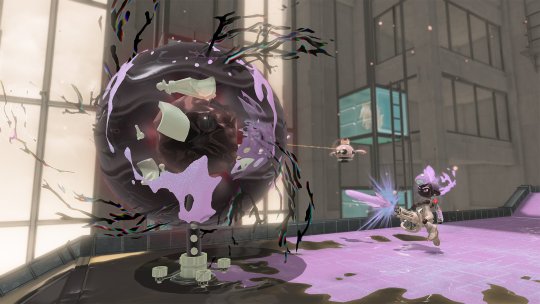
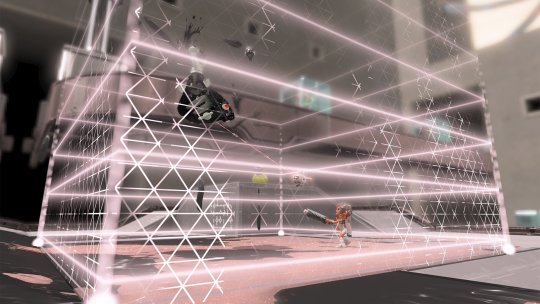


SplatoonNA:
A note for the part-timers! Bonerattle Arena, the final map for Salmon Run, arrives with Fresh Season 2024!
A place of exile that’s been modified into an arena, Salmonids battle day and night here to see who’s strongest.
They’re equally eager to fight anyone after their eggs.
SplatoonJP:
ここは「どんぴこ闘技場」。
サーモンランの最後の追加ステージだ。
流刑地を改造して作られたこの闘技場では、より強く、よりおいしいシャケを決めるための決闘が日夜繰り広げられている。
挑戦するイカたちに対しても、彼らはやる気満々のようだ。
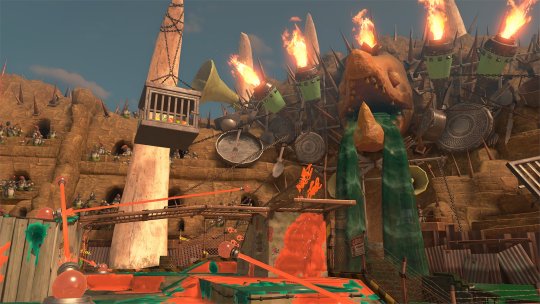
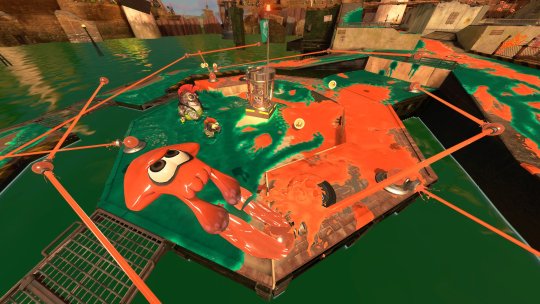
SplatoonNA:
A Grizzco industries rep has asked us to relay the following:
“Due to recent financial windfalls, additional slopsuits, gear, banners, decorations, stickers and more will soon be made available for purchase by Salmon Run employees. Keep it up.”
SplatoonJP:
シャケのウロコと交換できる景品も続々と追加されるぞ。
バイト作業着の新たなバリエーション、バトルで使える一風変わったギア、プレート、オキモノ、ステッカーなど、気になる景品が目白押しだ。
これはウロコがいくつあっても足りないな……。

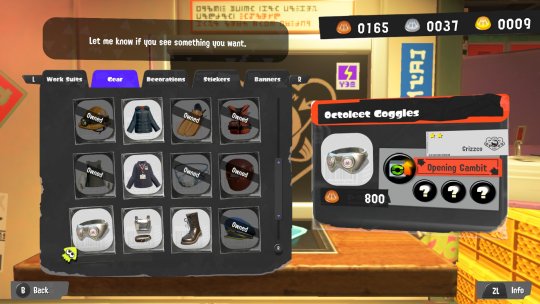

Continuation
59 notes
·
View notes
Text
リンチのほらあの場面
妻が子どもと一緒に空を眺めていたら、子どもが雲の形を気に入らないといって癇癪起こして泣き出した、という夢を見たらしい。繊細すぎる。詩の才能があるかもしれぬ。
*
5年くらい着てるモッズコートの肩の部分がヤケなのかスレなのか、カーキ色が茶けてきてしまってちょっとみすぼらしい。『さらば青春の光(むろん映画の方)』でジミーが着ているものをフレッドペリーが再現したモデルで、かなり気に入っているんだけど。そもそも本物のモッズ達は米軍払い下げの放出品を着ていたというから、少なからずヴィンテージ感があった方が良いのかもしれない。ということにしておく。
*
「ゲゼルシャフト」と「ゲマインシャフト」という言葉をおぼえた。利益社会と共同体。使う機会も無さそうなので忘れる前にここに書いておく。
*
アマプラで『PERFECT DAYS』ようやく観た。何かむかつく。何あれ。でも役所広司は好き。『すばらしき世界』も観た。役所広司の九州訛りは実家のような安心感。ラストのアンガーマネジメントについて、妻と話し合った。「知的障害者の善性」を感動の装置のように利用する演出に俺は抵抗がある。
10 notes
·
View notes
Text
I am a Japanese Jooster fan, and sorry if my translation is wrong.
In Japan, there are two types of translations for the works of Wodehouse. One is the translation by Tamaki Morimura, which is used for the manga version, and the other is by Masakatsu Iwanaga and Taiichi Koyama.
It seems Morimura's version gives weight to recreate the flavor and character images, while Iwanaga and Koyama forcus on replacing exactly what original text means with Japanese.
Now, regarding the part that all Jooster fans frame and display, "I'm fond of Mr. Wooster...," Iwanaga and Koyama's translation is, ”大好きなウースター様のことですから、お顔を見るとくじけそうな気持ちになりました.”
In this case, the term "大好き(Dai suki)" strongly express the sense of affection. In Japan, it's not common for someone of lower status to describe someone of higher status as "大好き," making it a frank and affectionate expression. It could be interpreted as Jeeves, being the older character, having a deep affection for the favorable young man, Bertie.
Of course, it's also possible to interpret it as "I love him," indicating a strong sense of love. In other words, Iwanaga and Koyama's translation conveys a meaning like, "I have a very good feeling (friendship, affection or love) about Mr. Wooster, so when I saw his despairing face, I almost faltered (in my determination to train him with severe methods)."
On the other hand, Morimura's translation is, "わたくしはウースター様が好きでございます。あの方のお顔を拝見して、わたくしはもう少しで心とろけるところであったと、認めるものでございます."
The phrase "好き(Suki)" is used in a wide range, from a confession of hidden love to a simple expression of goodwill. So, while it may sound slightly more serious than "大好き", the difference from Iwanaga and Koyama's translation is not significant.
The issue arises in the subsequent part. Morimura translates "I admit I came very near to melting," using the imagery of "melt" as "心とろける(kokoro torokeru)" ("my heart felt like it was about to melt").
The problem is that the Japanese phrase "心とろける(herart + melt)" does not necessarily imply a wavering of resolve or a softening of emotions; rather, it carries a strong image of entrancement or in ecstasy. In other words, while Iwanaga and Koyama's translation allows for the imagining of gentle Jeeves, Morimura's translation opens the door to envisioning sadistic Jeeves who is enraptured by Bertie's despairing face. I don't know what the word "melting" exactly means in English, but translation is indeed fascinating!
Note that both Jeeves will carry out the training as planned.
Japanese version of this blog :
日本におけるウッドハウス作品の翻訳には2種類あります。漫画版の元になった森村たまき訳と岩永正勝・小山太一訳です。
私は英語に詳しくないので間違っているかもしれませんが、森村訳が比較的雰囲気やキャラのイメージ重視なのに対し、岩永・小山訳は原文に書いてあることだけをシンプルに日本語に置き換えた感じです。
さて、全世界のJoosterファンが額縁に入れて飾っている"I'm fond of Mr.Wooster…"の部分ですが、岩永・小山訳は「大好きなウースター様のことですから、お顔を見るとくじけそうな気持になりました」です。この場合の「大好き」はかなり強い親愛の情を示す言葉です。日本では通常身分の低い者が身分の高い人を「大好き」と形容することはあまりないので、フランクかつ親しみのこもった言い方と言えます。年長者であるジーヴスが好ましい若者のバーティに強い親愛の情を持っている、という解釈なのかもしれません。もちろん、「愛している」という意味に解釈することも可能です。つまり、岩永・小山訳は「私はウースター様をとても好ましく思っているので、彼の絶望した顔を見て(彼をひどい目に合わせて調教しようという決意が)くじけそうになった」ぐらいの意味です。
一方、森村訳は「わたくしはウースター様が好きでございます。あの方のお顔を拝見して、わたくしはもう少しで心とろけるところであったと、認めるものでございます」です。「私は(人名)が好きです」は秘めたる愛の告白から単なる好意の表明まで幅広く使われますので、「大好きなウースター様」より若干真剣な告白に聞こえるものの、岩永・小山訳とそこまで違いはありません。問題はその後です。森村訳は"I admit I came very near to melting"のmeltのイメージをそのまま用いて「心がとろけそうだった」と訳しています。問題は日本語の「心とろける」に決意が鈍るとか感情が和らぐという意味があまりなく、うっとりする、恍惚とするようなイメージが強いことです。つまり、岩永・小山訳では善人(ぶっている)ジーヴスが想像できる一方、森村訳では大好きなウースター様の絶望した顔を見てうっとりするサディストのジーヴスが想像可能だということです。翻訳って面白いですね。
あなたはどちらの訳が好きですか?
大好きなウースター様への調教を躊躇する優しいジーヴス
ウースター様が好きなので絶望顔をうっとり眺めるジーヴス
なお、どちらも調教は予定通り行います
69 notes
·
View notes
Text

Legends and myths about trees
Celtic beliefs in trees (26)
I for Idho (Yew) - December 21st Winter Solstice
“Death of a king in his waning 6 months - The Celtic Tree Calendar (Ref), the end of the beginning, the beginning of the end ...”
Colour: dark green; Star: Saturn; Gemstone: olivine; Gender: female; Metal: lead, Element: earth; Patron: Banba, Hecate; Symbols: resurrection, death + rebirth, eternity, path to meet ancestors + land of the soul
Today is the winter solstice, also called the hibernal solstice, the day in the northern hemisphere when the sun is at its lowest altitude in the south and day is shortest and night longest during the year (reversed in the southern hemisphere).
Yew is an evergreen tree with dark green leaves and red berries. The yew is a robust tree with a thick girth and an extremely long life. It is probably the longest lived of all trees.
As soon as the downward reaching branches reach the ground, the tree begins to grow strongly, as if it has been reborn as a new tree. The eldest living yew tree is in Europe is said to be the Fortingall Yew, in Perthshire, Scotland, and it has been estimated between 3000 to 9000 years old.
In addition, the yew's hollowed-out heartwood, especially when wet, looks like a flayed animal, and when cut it appears to bleed, so the yew is increasingly said to be a sacred tree. Yew sticks were believed to be able to divine the future, and yew sticks were used as 'writing pillars' to engrave the Ogham script, as they could be preserved almost forever.
As the druids believed the natural law of reincarnation, where the soul becomes reborn as another person, the yew was seen as a protector of the soul during the journey to the Otherworld. Some believe that the road to the Otherworld is shaded by rows of yew trees. Furthermore, the yew is said to stop any obstacles caused by evil spirits from the other world.
As a sacred 'tree of immortality', believed to protect and purify the dead, yews are often planted in cemeteries, many of which are as old as the church or much older.

ケルト人の樹木の信仰 (26)
IはIdho (イチイ) - 12月21日 冬至
“衰えゆく半年の王の死 〜 ケルトの木の暦(参照)、始まりの終わり、終わりの始まり…”
色: 深緑; 星: 土星; 宝石: オリビン; 性: 女性; 金属: 鉛; 要素: 土; 守護神: バンバ、ヘカテ; シンボル: 復活; 死+再生、永遠、先祖に出会える道+魂の国
今日は冬至、北半球では太陽の南中高度が最も低く、一年の間で昼が最も短く夜が最も長くなる日(南半球では逆転する)。
イチイは濃い緑色の葉を持ち、赤い果実を実らせる常緑樹。イチイはたくましい樹木で胴回りが太くなり、ものすごく長生きをする。おそらくすべての木の中で最も長生きする木といえるだろう。下方に伸びた枝が地面に着くと、新しい木に生まれ変わったかのように、力強く生育を始める。ヨーロッパで最も古いイチイの木は、スコットランドのパースシャーにある『フォーティンゴールのイチイ』と言われており、樹齢は3000年から9000年と推定されている。
また、幹の中が空洞になったイチイの心材は、とくに湿っていると、一見皮を剥がれた動物のようで、切れば血を流すようにも見えるため、ますますイチイは聖なる木だといわれるようになった。
イチイの杖は未来を占うことができるとされ、またイチイの棒はほぼ永遠に保存できるため、オガム文字を刻印する「文字棒」として使用された。ドルイドは、魂が別の人間に生まれ変わるという輪廻転生の自然法則を信じていたので、イチイはあの世への旅の間、魂を守ってくれるものと考えられていた。冥界に至る道はイチイ並木の木陰になっているという説もある。さらに、イチイは異界の悪霊が起こすいかなる障害をも食い止めるという。
神聖なる「不死の木」として、死者を守り浄化すると信じられたイチイは墓地によく植えられ、その多くは樹齢が教会と同じか、またはそれよりずっと古い。
#trees#tree legend#tree myth#folklore#mythology#legend#celtic mythology#yew#nature#art#winter solstice#celtic calendar
132 notes
·
View notes
Text

Photo by Bruno Souza on Unsplash
2024年8月31日
To be honest, August was really just an exercise in staying afloat. I was able to continue my little habits since I've been doing them so long that they are just something I do in my spare time. But anything else was really hit or miss! I also realized I had forgotten to set goals for August so I guess it worked out since I didn't miss any goals! Sometimes life just happens, so I try not to worry too much about it. Now with September and a new Japanese preschool year beginning (yes they follow the American system at this school), I want to try to focus on making significant improvement again.
実は8月が忙し過ぎて勉強じゃなくて他のところに集中しました。毎日の小さな勉強習慣をいつも通り続きましたが、他の目的は少し雑でした。後、7月に8月の目標を書いてなくて、実は目標を達成しなくても大丈夫でしたね。たまにそういうこともあるから、何とかなるのであんまり気にしないように頑張ります。そして9月になって、息子の幼稚園の新しい学年(そうです、日本風の幼稚園だけどアメリカの学年なんだ)が始まったので、これからまた上達するためにまた動力しようと思います。

August Progress
I spent most of my time in August on Listening and Speaking, and the least time on Vocabulary and Kanji. Listening was primarily listening to (children's) TV shows, podcasts, and conversations, and the Speaking study time I recorded was primarily conversations (with ママ友s and this time I recorded in-depth conversations with my son and husband because my son can participate in actual conversations when did that happen).
I feel like I did a lot of Reading in August but less Grammar and Writing, because I had so much going on and I was just trying to keep on top of all my responsibilities and also trying to get enough sleep.
In July I didn't do a study habit check-in, but let's see how I did in August:
Study Habit Check-In:
〇 = Great, △ = Decent, ✖ = Not Great
Read daily - read something almost every day 〇
Write sentences 4 times a week - definitely not, but that's ok, I was busy! ✖
Review kanji and vocabulary flash cards daily - nope, no, not at all ^^; ✖
Review 1-2 N3 grammar points weekly - I did review grammar points but it wasn't as often as once a week △
Learn 1-2 N2 grammar points weekly - I reviewed a couple of N2 grammar points but did not learn any new ones △
Listen to 1 podcast a week - yes! 〇
Continue to work on hiragana with my son - not sure where we are at this point, we are reading books and I am trying to pinpoint which characters he knows and which ones he doesn't know; characters like ちゃ and じ (I learned today these are called 拗音・ようおん) are understandably difficult for him; since we practice every day I call this a win 〇

September Goals
I'm super motivated for September, let's gooo!
I want to get back into my study materials such as:
新にほんご500問 (Kanji, Vocabulary, Grammar drills)
日本語総まとめN2 (Kanji, Vocabulary, Grammar, Listening, Reading workbook)
外国人のための日本語敬語の使い方 (85 Basic Expressions of Japanese honorifics for Quick and Easy use, aka Keigo)
日本の歴史366 (daily history lesson)
I also got really excited and checked out way too many textbooks on the Japan Foundation (Libby) so I'd like to go through those as well.
And finally, I'd like to take a tip from some of the ママ友s (those are mom friends) and start taking time on weekends to work on hiragana recognition with my son (very mindful). Making it fun helps keep his interest, and we are fortunate to have collected a lot of Japanese children's books in a range of levels to practice with.
How is your studying going? Any new study tips or new classes? Feel free to comment or DM me! Happy studying!
皆さんの勉強はどう?新しい勉強方法や授業を始めたの?コメントやDMをどうぞ!上達できますように!
#日本語#japanese#japanese language#japanese langblr#japanese studyblr#langblr#studyblr#日本語の日記#japanese diary#japanese goals#japanese goals 2024#tokidokitokyo#japanese studyspo#my photo#tdtphoto#japanese goals august 2024
15 notes
·
View notes
Text

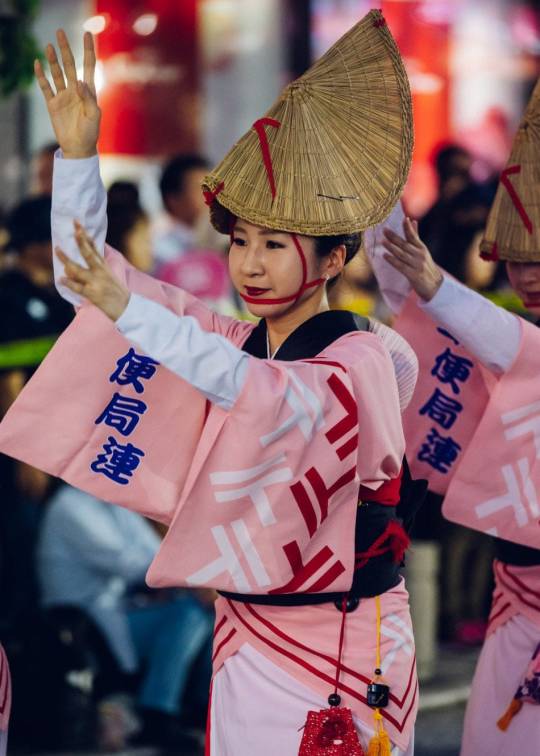

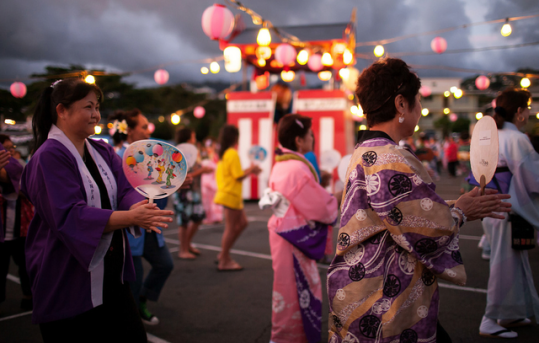
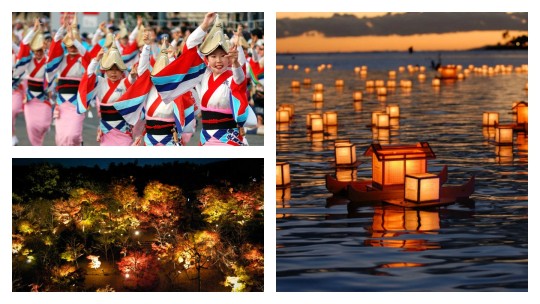

Sean bienvenidos, japonistasarqueológicos a una nueva entrega, en esta ocasión hablaré sobre Obon el festival de los difuntos una vez dicho esto pónganse cómodos que empezamos. - En Japón, en los días de agosto, del 13 al 16, se celebra el Obon, que lo podemos ver en multitud de animes, películas y doramas ya hice mención sobre que estas cosas no solo hay que verlas, como meros dibujos, ya que tienen mucho sentido cultural e histórico. Esta festividad tiene muchos elementos muy característicos como el Gozan no Okuribi también llamado Daimonji, muy característico de finales de estas fiestas, porque suelen ser una serie de dibujos alguno de un torii y otros como el kanji de fuego, por mencionar algunos ejemplos. - Los pepinos(se utiliza para cuando el difunto llega) y berenjenas(caso contrario cuando el difunto se va ) simbolizan la llegada y el regreso del difunto al más allá. Hay muchos países que celebran esta festividad de formas distintas, pero todos tienen en común que honran a sus antepasados, es una festividad que tiene 400 a 500 años de antigüedad y es de origen budista. Para finalizar la publicación mencionaremos el Awa-Odori, (Odori significa bailar) y data del siglo XVI. - Espero que os guste y nos vemos en próximas publicaciones, que pasen una buena semana.
日本の考古学者の皆さん、新しい回へようこそ。今回はお盆についてお話ししましょう。 - 日本では、8月の13日から16日にかけて、お盆の行事が行われる。 アニメや映画、ドラマなどでもよく見かけるが、これらは単なる絵空事ではなく、多くの文化的、歴史的な意味を持っていることはすでに述べた。例えば、五山の送り火は「大文字」とも呼ばれ、鳥居の絵や「火」という漢字の絵など、お盆の風物詩となっている。 - キュウリ(故人が来るときに使う)とナス(故人が帰るときに使う)は、故人があの世に到着し、戻ってくることを象徴している。この祭りをさまざまな方法で祝う国はたくさんあるが、先祖を敬うという点では共通している。阿波踊りは16世紀に遡る。 - それでは、良い一週間を。
Welcome, Japanese archaeologists to a new installment, this time I will talk about Obon, the festival of the dead, and with that said, make yourselves comfortable and let's get started. - In Japan, in the days of August, from the 13th to the 16th, Obon is celebrated, which we can see in many anime, movies and doramas. I have already mentioned that these things should not only be seen as mere drawings, as they have a lot of cultural and historical meaning. This festivity has many very characteristic elements such as the Gozan no Okuribi also called Daimonji, very characteristic of the end of these festivities, because they are usually a series of drawings of a torii and others such as the kanji of fire, to mention some examples. - Cucumbers (used for when the deceased arrives) and aubergines (otherwise when the deceased leaves) symbolise the arrival and return of the deceased to the afterlife. There are many countries that celebrate this festival in different ways, but they all have in common that they honour their ancestors, it is a festival that is 400 to 500 years old and is of Buddhist origin. To end the publication we will mention the Awa-Odori, (Odori means dancing) and dates back to the 16th century. - I hope you like it and see you in future publications, have a nice week.
#日本#歴史#文化#オタク#アニメ#お盆#阿波踊り#五山の送り火#大文字#ユネスコ#祖先#Japan#history#culture#otaku#anime#Obon#AwaOdori#GozannoOkuribi#Daimonji#unesco#ancestors
46 notes
·
View notes